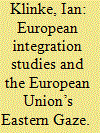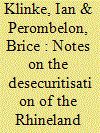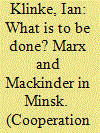| Srl | Item |
| 1 |
ID:
141204


|
|
|
|
|
| Summary/Abstract |
European integration studies has recently seen the first signs of a belated critical turn. While new approaches have started to challenge the way the European Union is conventionally studied, they are yet to investigate in detail the relationship between the academic field and its primary object of study. This article draws on work in critical geopolitics to explore one of the interfaces of academic knowledge on European integration and the world of policy: the Jean Monnet Programme. In highlighting the scheme’s role in the EU’s Eastern geopolitics, it argues that European integration studies resembles other forms of area studies, such as cold war era Sovietology. This comparison elucidates both the field’s long-standing resilience to critical theory and its inability to anticipate the recent crisis of the European project.
|
|
|
|
|
|
|
|
|
|
|
|
|
|
|
|
| 2 |
ID:
106747


|
|
|
|
|
| Publication |
2011.
|
| Summary/Abstract |
Are we witnesses to the resurrection of geopolitics in Germany? At first sight the recent emergence of a 'new Cold War' narrative on Russian energy appears as part of a wider renaissance of geopolitics. Yet, a closer look will reveal the presence of a stealthy quasi-liberal geopolitics, equally laden with spatial language that preceded the new Cold War. This article tries to unpack this earlier narrative of 'strategic partnership' that has remained popular within the German energy policy establishment. Here we encounter a story of cooperation between two former geopolitical rivals that are situated within a Europe that seeks to modernise a yet backward but adaptive East. Hence, what we could observe is not the death and rebirth of geopolitics, but merely a partial narrative transformation from one type of geopolitics to another. The article suggests that geopolitics could not have been dead, for it has always been undead.
|
|
|
|
|
|
|
|
|
|
|
|
|
|
|
|
| 3 |
ID:
142779


|
|
|
|
|
| Summary/Abstract |
During the first half of the twentieth century, the river Rhine constituted the key source of insecurity between France and Germany. Contemporary observers have claimed that the river lost this role in the 1950s due to the dynamics of Franco-German rapprochement and the emergence of the European Coal and Steel Community. This article tries to complicate this story in three steps. First, it shifts attention from early European integration to the North Atlantic Treaty Organization and its role in the desecuritisation of the Rhine. Subsequently, it discusses the river’s loss of strategic significance in West Germany due to the particularities of post-war statehood and the country’s idiosyncratic geopolitics. Finally, the article argues that it was only the development of an independent French nuclear deterrent capacity between 1966 and 1972 that ultimately took the boundary from France’s geopolitical map.
|
|
|
|
|
|
|
|
|
|
|
|
|
|
|
|
| 4 |
ID:
114177


|
|
|
|
|
| Publication |
2012.
|
| Summary/Abstract |
The discourse on EU-Russia relations amongst practitioners, think-tank experts, journalists and academics has congealed around a postmodern-modern binary. It is frequently argued that whereas Russia is caught up in a 'modern' framework of fixed territory, national identity and traditional geopolitics, the European Union is driven by a 'postmodern' spatial mindset that transcends these 'backward' values. This article argues that the EU's supposed postmodern geopolitics remains enmeshed in a very modern temporality-a consciousness of time that valorises the present over the past. It also detects a problematic disillusion with the postmodern and questions its implicit normativity.
|
|
|
|
|
|
|
|
|
|
|
|
|
|
|
|
| 5 |
ID:
119233


|
|
|
|
|
| Publication |
2013.
|
| Summary/Abstract |
This article is prompted by recent calls for a 'Marxist geopolitics'. By exploring the case of contemporary Belarus, it argues that a Marxist geopolitics already (or rather still) exists in the world beyond the academic ivory tower. A dissection of foreign political discourse surrounding President Alexander Lukashenka over the last decade exposes two narratives that draw extensively from the repertoire of Soviet geopolitics. Whilst the first Marxist-Leninist storyline revives the early USSR's geopolitical position as a young state in the midst of a dystopian Western capitalism, the second one is familiar from the dying days of the Soviet empire and tells the story of a state that lies at the centre of a utopian common European house. The conclusion assesses the neo-Marxist concept of the 'anti-geopolitical', but finds it to have difficulties in accounting for the struggle of the Belarusian opposition.
|
|
|
|
|
|
|
|
|
|
|
|
|
|
|
|